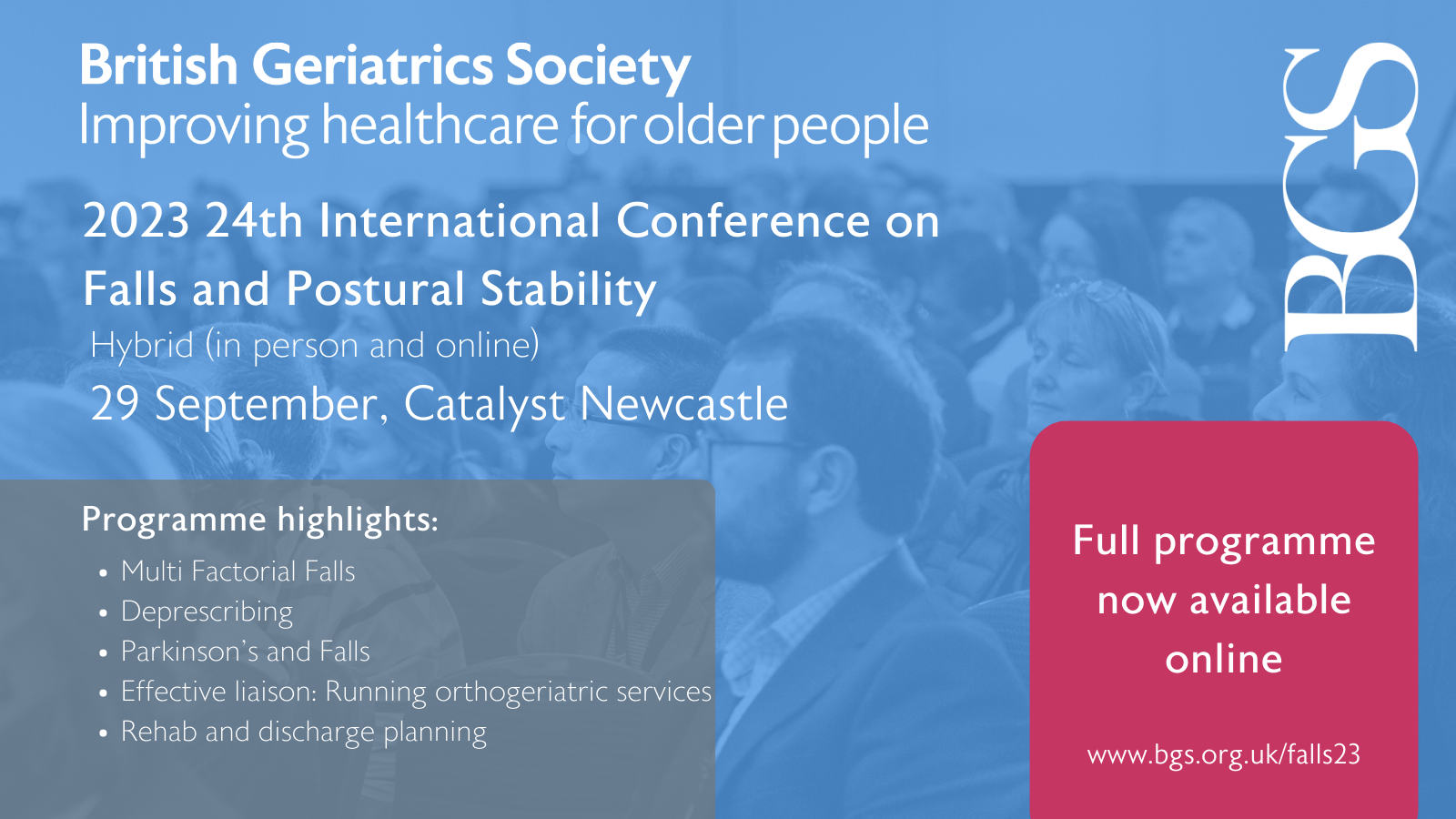
James Frith is a Consultant Geriatrician in Newcastle and Chair of the BGS Falls and Bone Health Special Interest Group. He will be speaking at the upcoming 24th International Conference on Falls and Postural Stability on 29 September 2023.
I am sure we are all familiar with the increasing numbers of fallers presenting to our services in recent years. The impact of lockdown and of the Covid-19 illness resulting in high levels of deconditioning, alongside the closure of falls services during the pandemic, may be felt for a long time to come. It is also concerning to note the results of a very recent US study. This study looked at mortality due to falls in people aged over 65 years. In the twenty years from 1999 to 2020 age-adjusted mortality rates increased from 29 to 69 deaths per 100,000, an annual percentage change of +4%1. While the anecdotal and statistical evidence is bleak, it is worth remembering that falls can be preventable, with multifactorial interventions reducing falls rates by about 25% and exercise interventions by around 30%. This is a particularly important point, especially when sometimes the number of falls we see clinically can feel overwhelming. The BGS 2023 24th International Conference on Falls and Postural Stability, 29 September, Newcastle and online, aims to bring timely knowledge, evidence, practice and opinion to those clinicians who see people with falls.
In 2020, in response to the pandemic the BGS International Falls and Postural Stability conference was delivered virtually and was a great success, increasing the global reach of the conference with 779 delegates from 17 countries and over 5 million impressions on Twitter. That same year, two important studies were published which called into question both multifactorial and exercise interventions: PreFIT (Prevention of Fall Injury Trial) and STRIDE (Strategies to Reduce Injuries and Develop Confidence in Elders) 2, 3. This prompted The Big Debate “Is it time to re-think multifactorial and exercise fall prevention strategies?” a lively debate at the 21st BGS International Falls and Postural Stability hybrid conference in 2021. I am pleased to see KFPS (Kuopio Fall Prevention Study) in Age and Ageing recently, adding more weight to the effectiveness of falls prevention exercise 4. In fact, I think we should stop debating the effectiveness of these interventions and focus on how to improve uptake and adherence.
2022 saw a major development in the field of falls, with the launch of the inaugural World Falls Guidelines (WFG). We were lucky to see an appetiser from these guidelines in last year’s BGS conference prior to their publication in Age and Ageing5. However, at this year’s conference we have an in-depth review of the World Falls Guidelines, delivered by members of the WFG working group. The 2022 conference was our first hybrid conference, with 25% of the delegates attending in person (out of 460 total attendees). The conference this year remains a hybrid conference; it will be interesting to see whether there is a trend to return to traditional attendance, or whether virtual attendance remains popular.
The last few years have seen many changes to the delivery of falls services, and it is not always easy to keep up to date with different local, regional and national programmes on falls prevention. With this in mind, our final speaker will provide an up to date overview on current initiatives.
As you can see from the programme, in addition to the World Falls Guidelines, topics will include the overlap between falls and fainting, the vestibular system, dizziness and falls and community-based approaches to falls prevention. Alongside the oral presentations we will have our ever-popular practical workshops, this year focussing on gait analysis, investigating fall incidents and bedside vestibular testing.
For those who are uncertain about attending I would strongly encourage you to attend as delegate feedback is always glowing. I would also like to highlight the BGS Event Grants which can be awarded to trainee doctors, nurses, midwives and allied health professionals, and clinical undergraduate students. More information on these grants can be found here: https://www.bgs.org.uk/grants
See the full Conference programme here on the British Geriatrics Society Website.
[1] Santos-Lozada AR. Trends in Deaths From Falls Among Adults Aged 65 Years or Older in the US, 1999-2020. JAMA 2023; 329: 1605-07. doi: 10.1001/jama.2023.3054
[2] Lamb SE, Bruce J, Hossain A, et al. Screening and Intervention to Prevent Falls and Fractures in Older People. N Engl J Med 2020; 383: 1848-59. doi: 10.1056/NEJMoa2001500
[3] Bhasin S, Gill TM, Reuben DB, et al. A Randomized Trial of a Multifactorial Strategy to Prevent Serious Fall Injuries. N Engl J Med 2020; 383: 129-40. doi: 10.1056/NEJMoa2002183
[4] Rikkonen T, Sund R, Koivumaa-Honkanen H, Sirola J, Honkanen R, Kröger H. Effectiveness of exercise on fall prevention in community-dwelling older adults: a 2-year randomized controlled study of 914 women. Age Ageing 2023; 52doi: 10.1093/ageing/afad059
[5] Montero-Odasso M, van der Velde N, Martin FC, et al. World guidelines for falls prevention and management for older adults: a global initiative. Age Ageing 2022; 51doi: 10.1093/ageing/afac205